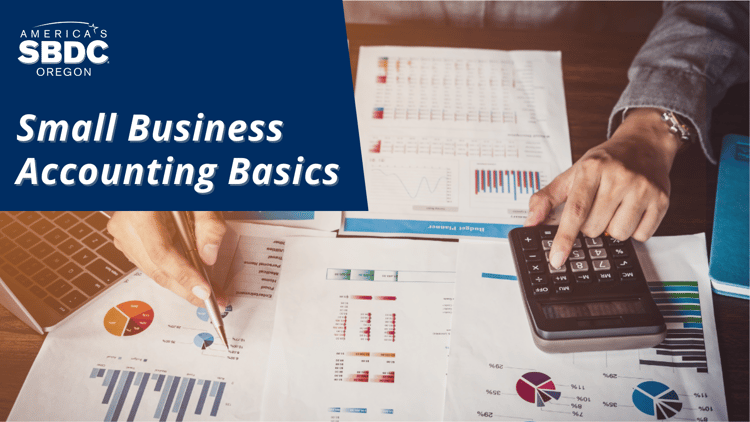
First published by the Oregon SBDC Network here.
Operating your own small business and being your own boss comes with many benefits but also brings new responsibilities. One of the biggest burdens of being a small business owner is handling the accounting. This includes keeping a record of all income and expenses and accurately reporting your business financials when tax season rolls around.
This article covers the basics of how small businesses can set up an accounting system and manage their bookkeeping effectively.
What is Small Business Accounting?
Small business accounting includes the process of tracking, recording, and analyzing your business’s financial transactions, including purchases, sales, expenses, payroll, and more. These numbers translate into a statement that provides a picture of your business’s profitability.
In short, small business accounting tracks the money that flows in and out of your business accounts and boils down to:
- Bookkeeping (recording financial transactions)
- Creating financial reports
- Filing tax returns
- Accounting also helps you determine the health and value of your company so you can adjust accordingly for short- and long-term success.
Below are some basic steps to help you to set up an effective accounting system for your small business.
Open a Business Bank Account
Once you’ve legally registered your business, you’ll need to have a separate bank account to cover all your business transactions. Not only does this make life easier come tax time, but it also protects your personal assets in the case of bankruptcy, lawsuits, or audits. Additionally, having a business bank account with detailed financial records can help you obtain funding from creditors or investors down the road.
Note that Oregon LLCs and sole proprietors don’t legally need to have a separate bank account, but it is highly recommended.
Start by opening a business checking account. It’s also a good idea to have a business savings account, which can help you organize funds and plan for taxes. For instance, if you automatically put a percentage of your business income into a savings account, you’ll have money set aside for your estimated taxes due each quarter. A good rule of thumb is to put aside 25% of your income, or perhaps more if you’re a high earner.
To open a business bank account, you’ll need a business name, and your business might have to be state-registered. Check with the individual bank on its requirements.
Consider a Business Credit Card
Having a business credit card can help build your company’s credit rating. And if you choose a card with benefits, you can earn cash-back rebates or travel points with your purchases.
Track Expenses
Accurate expense tracking is essential for monitoring business growth, developing financial statements, keeping track of deductible expenses, and preparing tax returns.
From the very beginning, your business needs to establish accounting methods for organizing receipts and other important records, which can be done manually or using accounting software.
What Expenses Do Small Businesses Need to Track?
The IRS requires that you keep documentation that proves income, credits, and deductions shown on your tax return. Although the records and receipts you need to save will depend on the nature of your business, generally you’ll want to keep the following:
- Receipts
- Bank and credit card statements
- Bills
- Canceled checks
- Invoices
- Proof of payments
- Financial statements
- Previous tax returns
- W2 and 1099 forms
- Any other documentation that supports an item of income, deduction, or credit shown on your tax return
- The IRS does not require receipts for certain expenses under $75. You can keep digital or paper copies of receipts, and there are many apps and online storage services that make it incredibly easy to scan, organize, and store all your receipts.
Below are the types of business expenses you need to keep a record of:
- Meals and entertainment
- Out-of-town business travel
- Auto-related expenses
- Receipts for gifts
- Home office receipts
Operating your business from your home helps keep overhead low and allows you to qualify for more tax deductions. The IRS allows you to deduct the portion of your home that’s used for business, as well as your internet and cell phone service, and transportation to and from work sites.
Any expense that’s for both business and personal use must reflect its mixed use. For instance, if you use one phone for both, you can deduct the percentage you use the device solely for business. Gas mileage costs are 100% deductible, so be sure to hold onto all records and keep a log of your business miles.
Develop a Bookkeeping System
Bookkeeping is the accounting process of recording transactions, categorizing them, and reconciling bank statements.
Accounting is the high-level process that provides an overview of your business progress and makes sense of the data compiled in your bookkeeping.
As a small business owner, you’ll need to determine how you want to manage your books:
- You can use software like QuickBooks online or use a simple Excel spreadsheet.
- You can outsource a part-time bookkeeper, one that’s local or cloud-based.
- When your business grows, you can hire an in-house bookkeeper or accountant.
You also need to determine whether to use the cash or accrual accounting methods. These are the differences between the two:
- Cash method. Revenues and expenses are recognized when they are actually received or paid.
- Accrual method. Revenues and expenses are recognized when the transaction occurs (even if the cash hasn’t been paid or received yet), so it requires tracking accounts receivable and accounts payable.
U.S. business owners can use cash-based accounting if revenues are less than $5 million. Otherwise, the accrual method must be used.
Determine How You’ll Get Paid
Most business transactions these days are not done in cash. Therefore, you’ll need to decide on a payment solution that works best for your business. This will come down to whether you accept payments in person, through a point of sale (POS) system, or online.
- POS system and in-person payments. If you accept both, consider getting a mobile credit card reader like Square. This is great for businesses that don’t expect to process a high volume of in-person purchases daily.
- POS payments only. If you perform only POS sales, you can use a POS system that works with a cash register or just a credit card reader independent of any cash collection system. For the in-person payment methods—POS systems or credit card readers—you need to have a merchant account with your bank. This account acts as an intermediary between the payment system and your bank account to withdraw and deposit funds.
- Online payments only. If you accept only online payments, PayPal and Shopify are two popular platforms for online retailers.
Set Up a Payroll System
When it makes sense for your small business to hire more help, you’ll need to determine whether you hire an employee or an independent contractor.
If you have employees, you’ll have to set up a payroll schedule and make sure you’re withholding the correct taxes. There are many services available to help with this, and if you use accounting software, many offer a payroll feature.
If you hire independent contractors, keep track of your payments to them, as you’ll be required to file a 1099 form for each contractor at the end of the year.
Tax Filing Obligations
The legal structure of your business determines your business’s tax obligations. If you’re a sole proprietor or your business is registered as an LLC or partnership, you’ll likely claim business income on your personal tax return. If you run a corporation, it’s considered a separate tax entity, and the income you receive from the corporation will be taxed independently, as though you were an employee.
Self-employed individuals need to withhold income tax the same way an employer withholds taxes from an employee’s paycheck. If you owe more than $1,000 in taxes for the year, you will need to pay quarterly estimated taxes four times a year.
When tax season comes around, technology is your friend! Understanding what business expenses you can deduct and using technology to track them will help to ensure you don’t pay more than you owe.
Be sure to have a program intended for business purposes, like QuickBooks, Sage, or Great Plains. While there are many “free” programs out there to track mileage and expenses, “Free is not free” when your data is lost!
Consider software that can help track:
- Mileage
- Travel and meal expenses
- Personal use of a dedicated home office space
- Receipts
- Time
If your needs are more comprehensive, the Oregon SBDC Network provides classes on small business accounting, budgeting, cash flow management, and QuickBooks—one of the most extensive financial reporting and management programs on the market for small business accounting purposes.
If you’re new to QuickBooks, you can learn how to set up new customer and vendor accounts, create invoices, record sales, and enter payments. If you are already using the basic features of QuickBooks but want to master its other offerings, advanced classes are offered throughout the state.
The PCC Small Business Development Center is here to support you with no-cost business advising and comprehensive business training programs. Get started by requesting your first no-cost business advising session here.



